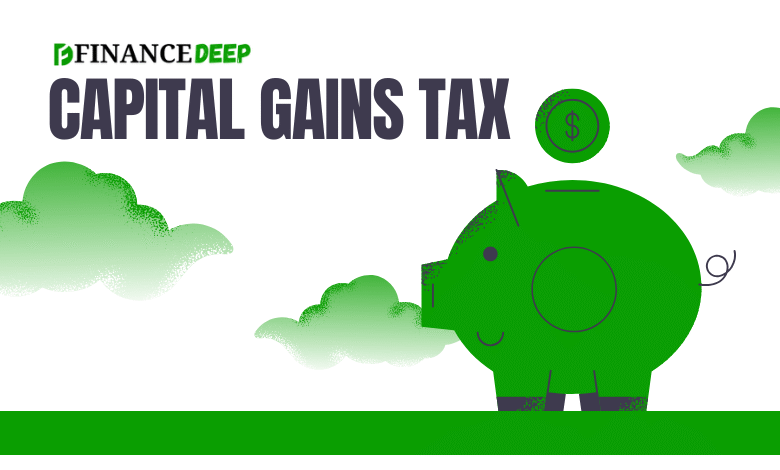
Capital gains tax (CGT) plays a crucial role in shaping financial strategies for millions of Americans. Whether you’re selling farmland, flipping homes, or cashing out investments, understanding how CGT works in 2025 will help you make better decisions and legally minimize your tax burden.
In this guide, we break down everything you need to know—from rates and thresholds to valuation strategies and avoidance techniques—tailored specifically for U.S. residents and FinanceDeep.com readers.
What Is Capital Gains Tax and Who Pays It?
Capital gains tax is charged when you sell an asset for more than you paid. The gain—not the total sale amount—is what’s taxed.
Types of Assets Subject to CGT:
- Real estate (including primary residences and farmland)
- Stocks, bonds, and mutual funds
- Cryptocurrency
-
Collectibles and other capital property
Key Distinction:
- Short-Term Capital Gains: Assets held ≤ 1 year. Taxed at ordinary income tax rates (10% to 37%).
-
Long-Term Capital Gains: Assets held > 1 year. Taxed at preferential rates (0%, 15%, or 20%).
If you’re in a higher income bracket, you may also owe the 3.8% Net Investment Income Tax (NIIT).
CGT Brackets for 2025 (Federal)
| Filing Status | 0% Rate | 15% Rate | 20% Rate |
|---|---|---|---|
| Single | Up to $48,350 | $48,351–$533,400 | Over $533,400 |
| Married Filing Jointly | Up to $96,700 | $96,701–$600,050 | Over $600,050 |
| Head of Household | Up to $64,750 | $64,751–$566,700 | Over $566,700 |
These brackets are adjusted annually based on inflation. Always verify using the latest IRS publication for the tax year.
Capital Gains Tax on House Sales
One of the most common questions is about capital gains on the sale of a home. Fortunately, the IRS offers a home sale exclusion:
Exemption Amounts:
- Up to $250,000 for individuals
-
Up to $500,000 for married couples filing jointly
Eligibility Criteria:
- Must have owned and lived in the home for 2 of the last 5 years
-
Home must be your primary residence
Use tools like a capital gains tax on house sale calculator to estimate what you’ll owe (or save).
Capital Gains Tax on Farmland
Farmland sales are increasingly complex due to rising land values, generational transfers, and mixed use of land.
1. Farmland Valuation
Farmland is typically valued based on:
- Purchase price
- Improvements
- Depreciation adjustments
- Market value trends
In 2025, farmland prices have seen slight dips (approx. 2–3%) from 2024 highs, easing some CGT burdens. USDA reports show regional variance, so knowing your local land value is key.
2. Farm CGT Strategies
- Installment Sales: Spread gains over several years.
- 1031 Exchange: Defer gains by reinvesting in other farmland or real estate.
-
Gifting and Estate Planning: Transferring to heirs may qualify for a stepped-up basis, reducing CGT upon sale.
How to Legally Avoid or Reduce Capital Gains Tax
Avoidance isn’t evasion—it’s strategy. Here are smart, legal ways to lower your CGT liability:
Top Capital Gains Tax Avoidance Strategies:
-
Hold Investments for 12+ Months
→ Unlock lower long-term rates. -
Harvest Losses
→ Offset capital gains with investment losses; deduct up to $3,000 against ordinary income. -
Time Your Sales
→ Sell in low-income years to stay in lower brackets. -
Use a 1031 Exchange (Real Estate)
→ Defer taxes by rolling gains into a “like-kind” property. -
Contribute to a Retirement Account
→ Tax-sheltered gains inside IRAs, 401(k)s, and Roth IRAs. -
Invest in Opportunity Zones
→ Defer or reduce gains with qualified opportunity funds. -
Primary Residence Exclusion
→ Sell your home tax-free (up to $500K) if conditions are met.
Is Trump Lowering Capital Gains Tax in 2025?
Although former President Donald Trump previously expressed support for reducing CGT—especially by indexing gains to inflation—no such law exists as of 2025.
His 2024 campaign hinted at tax cuts, but legislative efforts like those proposed by Sen. Ted Cruz (e.g., inflation indexing) haven’t advanced beyond discussion. For now, CGT laws remain unchanged under the current administration.
State CGT: Know Where You Live
States differ widely in how they handle CGT:
| State | CGT Treatment |
|---|---|
| California | Taxed as ordinary income; rates up to 14.4% |
| Florida & Texas | No state income or capital gains tax |
| New York | Up to 10.9% including city surcharges |
| Washington State | 7% tax on gains > $262,000 (with some exemptions) |
Tip: Consider state taxes when timing relocations or property/investment sales.
Example: How CGT Impacts a Home Sale
Case: Sarah, a single filer, bought her house in 2015 for $300,000. She sells it in 2025 for $650,000.
- Gain: $650,000 – $300,000 = $350,000
- Exemption: $250,000 (as a single filer)
- Taxable Gain: $100,000
-
CGT Owed: Likely 15%, or $15,000
By leveraging the home sale exclusion, Sarah avoids paying CGT on most of her profit.
CGT 2025 – FAQ
1. Do I pay CGT on inherited property?
Usually not right away. The step-up in basis means the asset is revalued at the date of death, reducing potential gains.
2. Is farmland CGT different than residential real estate?
Yes. Farmland may qualify for depreciation recapture and estate planning provisions like Section 2032A (special use valuation).
3. Can I use retirement accounts to defer CGT?
Yes. Assets held inside IRAs, Roth IRAs, or 401(k)s grow tax-deferred (or tax-free in Roths), shielding gains until withdrawal.
4. What happens if I sell before one year?
The gain becomes short-term, taxed at ordinary income rates, which are higher than long-term CGT rates.
5. Will CGT increase under new tax reforms?
As of mid-2025, no new reforms have passed. However, future changes remain a political topic. Stay updated with credible finance news.
Conclusion: Take Control of Your Capital Gains Strategy
Capital gains tax is not just a legal obligation—it’s a financial strategy tool. With the right planning, knowledge of exemptions, and use of loss harvesting or property exchanges, you can legally reduce your CGT burden and keep more of your profits.




